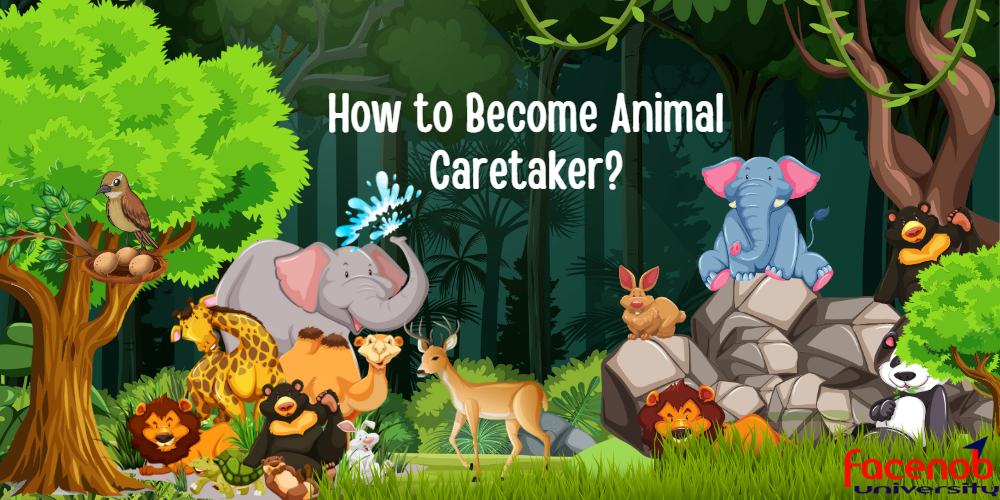How to Become Animal Caretaker?

Introduction of Animal Caretaker
Almost everyone adores animals; how much do you adore them? Are you prepared to train, groom, play, walk, and care for them for an extended period? If you answered yes, you should think about becoming an Animal Caretaker.

Also Known As
- Animal Care Giver(ACG)
- Aquarist
- Dog Bather
- Dog Groomer
- Groomer
- Kennel Attendant
- Kennel Technician (Kennel Tech)
- Pet Groomer
- Pet Stylist
- Zookeeper
Typical Job Responsibilities
What do Animal Caretakers do?
An Animal Caretaker would typically need to:
- Train, feed, groom, exercise, and care for animals
- Feed and give water to the animals; clean the equipment and living spaces of animals
- Keep track of animals’ physical health, behaviour and diet; examine animals for signs of illness or injury
- Exercise, bathe and groom animals; train animals to obey and behave appropriately.
Standard Work Environment
Depending on the job, animal carers work in a variety of settings. Stables, kennels, zoos, aquariums, animal shelters, veterinary clinics, and pet stores are all possible places for them to work. Travel may be required for this job.
Work Schedule
Work schedules are erratic. They could include vacations, late nights, weekends, and travel. Animal caretakers who work in 24-hour facilities such as animal shelters, kennels, and stables must provide continuous care and may work in shifts. Even though most Animal Caretakers work full-time, it is common for them to find part-time work.
Employers
Finding a new job might seem challenging. Animal Caretakers can boost their job search by asking their network for referrals, contacting companies directly, using job search platforms, going to job fairs, leveraging social media, and inquiring at staffing agencies.
Animal Caretakers are generally employed by:
- Veterinary Clinics
- Veterinary Colleges
- Animal Breeders
- Animal Shelters
- Zoos
- Farms
- Kennels
- Pet Stores
- Aquariums
Unions / Professional Organizations
Organizations like the International Association of Animal Behavior Consultants can provide knowledgeable information as well as opportunities to meet like-minded individuals.
Workplace Challenges
- Witness unpleasant sights including injured, sick, or abused animals
- The need to undertake euthanization of unwanted or injured animals
- A significant amount of manual labor, including cleaning and moving cages, exercising the animals, and lifting bags of animal food
- The risk of injury or illness when working with or cleaning aggressive or scared animals
Suggested Work Experience
Working with animals in various settings is a valuable experience that will allow you to make an informed decision on the right role for you. Volunteering at animal shelters and internships at zoos and aquariums are both options. Assistant caretakers are entry-level positions allowing you to learn the ropes under expert supervision. You could also work on farms, in veterinary practices, kennels, aquariums, and zoos.
Recommended Qualifications
Aspiring Animal Caretakers typically require a high school diploma or its equivalent. A bachelor’s degree in biology, animal science, or a related field may be required for some positions. Online courses and grooming schools, community colleges, and vocational and private training schools may provide the necessary knowledge.
Certifications, Licenses, and Registration
Although certification is not required in all fields, dog trainers, groomers, and pet sitters would benefit from certification courses. Scuba diving certification is also required for marine mammal trainers. Animal Caretakers who work for themselves must obtain a business license.
Projected Career Map
Career advancement is driven by performance, experience, and the acquisition of professional qualifications. As a result, Animal Caretakers who consistently demonstrate high-performance levels may be eligible for promotion every two to three years. You could advance to the position of Senior Caretaker, then Assistant Facility Manager, and finally Facility Manager.
Job Prospects
Having much prior experience, skills, and education will make qualifying for a job like Animal Caretaker easier and increase future job prospects.
Beneficial Professional Development
The majority of Animal Caretakers are trained on the job. An aspiring Animal Caretaker may pursue a degree in animal behaviour/management, biology, pharmacology, physiology, or toxicology depending on available positions. CPD will assist an active Animal Caretaker develop personal skills and proficiency through work-based learning, a professional activity, formal education, or self-directed learning. It enables you to constantly improve your skills, regardless of your age, job, or level of knowledge.
Conclusion
Some people consider their animals to be family members, and it is the responsibility of Animal Caretakers to protect, care for, and love that part of the family. One of the most rewarding aspects of this career is the opportunity to form special bonds with the animals; the other positively impact an animal’s life by showing it love and genuinely caring for it. Every animal is unique and necessitates special care, training, and affection. So, if you decide to pursue this career, be prepared for some unique and rewarding experiences.
Explore Also: How To Become Agronomist?
